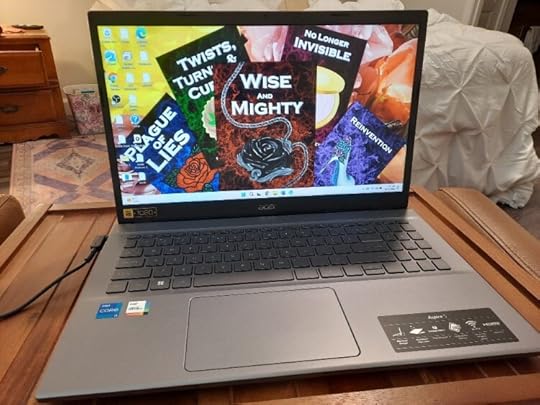Writing for Cows
My husband drives for Uber, and one of the perks of working for that company is the weekly challenges. When drivers complete a set number of rides, they get a bonus. Sometimes the bonus is significant, sometimes, not so much, but every little bit helps.
Because we’re both fans of Bob’s Burgers, we’ve taken to calling those bonuses “cows,” as in, “I’m gonna get me a cow!” It’s an obscure reference to the third episode of season one, “Sacred Cow.” It only makes sense to the two of us (and the other rabid fans of the show who realize that almost every quote from the series is obscure).
I have my own cows to get (but because I’m a vegetarian, they’re made of soy and come from Morningstar Farms). As a writer, my focus tends to be on word count, edits/rewrites, marketing, and sales. My bonus cows, however, are the phenomenon of getting lost in the stories I write. It’s not an easy state to achieve, but when it happens, I can write all day to the near exclusion of everything else. On those days, I can proudly say, “I got myself a cow!”
I never know when this feeling will strike, but it’s always welcome. When I’m in edit/rewrite mode, I’ll get little cows (calves), by recrafting scenes to bring out the emotional depth of a character and connect them to a past event or begin to foreshadow their future. There might even be the discovery of a tie between the characters of the WIP and those of a previous novel and the invitation of the PN characters to visit and drop a little wisdom.
Yesterday was one of those days — and it was glorious! Cows everywhere!
In my WIP, I’m working on an angle I’ve never written before. One of my main characters is an unreliable narrator and a narcissist, but no one notices. The character has been formed by a community/family/church that regards narcissists as leaders. And few people tend to question leaders. My research has been fascinating, but always before, I’ve had this type of person acting as a side character at best, and as a villain at worst.
Yesterday, I began peppering this character’s actions, thoughts, and dialog with tiny hints of their narcissistic tendencies. I got to go into their past and lay some groundwork, exposing what really happened with how it was presented by the character. My other main character isn’t aware just yet that the person they’ve tied their life to is a manipulator.
I usually craft my main characters to be approachable and relatable. Despite the struggles I put my characters through, I want readers to understand their motivations, fears, and strength and even see a bit of themselves in the inner workings of those people on the page. When I’m writing a scene, I tend to take on the characteristics of the person I’m writing about—to a lesser extent. When my characters are sarcastic, I’m usually rolling my eyes or smiling as I write. When they have an emotional breakthrough, I’m crying. When they have a panic attack, I tap into my own memories of panic and anxiety and try to faithfully recreate that on the page, not worrying about my breath or senses until the scene is done.
But when that scene is done? COW!
Now I’ve got an undercover baddy as an MC, and it’s a different experience. I started my research with books like When Narcissism Comes to Church by Chuck DeGroat.
Now, I’m watching documentaries and movies featuring narcissists to observe their body language and the cadence of their dialog. Mentally, I’m trying to relate to how they see themselves to tap into their emotional responses — some of which are real and others which are slipped on like disguises, easily discarded depending on the situation.
Usually, I tap into my personal experience when it comes to an MC’s emotive reactions. I know I’m not the only writer who does this. I’d say it’s all writers, but I’m sure there are some out there who write without personal emotion (seems weird, but you do you, Boo).
I don’t think many readers understand that writers go for those cows by putting themselves on the page, not ONLY when it’s uncomfortable, but ESPECIALLY when it’s uncomfortable. In fact, some readers tend to mock writers without digging deeper into why we describe things as we do. One of the best examples of this is the overuse of the phrase, “She let out a breath she didn’t even know she was holding.” Readers online tend to lose their ever-lovin’ minds over this phrase, because, for a while, it seemed to be in every book published. Now, writers avoid it. But where did it come from? I guarantee it came from a writer’s own response to a stressful situation, and they faithfully recorded it on the page. A reader might see it as lazy writing and not acknowledge its visceral meaning.
But I’ve been there. When I’m feeling overwhelmed, I tend to unintentionally hold my breath until my body takes over and forces it out, restarting my automatic breathing. I am so focused on getting through the crowd, finding a safe space, or preparing to talk to someone without sounding like an idiot, that I am unaware I’m holding my breath until it’s released.
Is the phrase overdone? Sure. It didn’t start out that way, but it was such an apt description of a physical phenomenon, it became too popular for its own good. For the first writer to accurately describe that experience and the future writers who began to pay closer attention to their own patterns of purposeful vs. automatic body behaviors, that phrase was a cow.
The last time I was in a full-blown panic attack, I was also in the weird writer’s zone where I mentally recorded my body’s responses to the trigger. I ended up using that reaction in my next WIP: the panicky part of her mind being fully shunted to the side, while the practical part continued a transaction, then the need for outside stimulation (music) to keep the memory evoked at bay, and her body becoming suddenly drenched in stress sweat as soon as she had removed herself from the triggering situation.
When it was time for my MC to experience her trigger (different than mine), I went through it with her — step by step, guiding her through to the other side. It was real and important to her development as a character. That reaction became the catalyst through which the reader could begin to understand her past and her need to move forward.
When we lose ourselves in the pages, the pieces come together, our stories take shape, and the characters come to life and begin to live their destiny. It’s an amazing feeling that writers chase page after page and novel after novel. It is those moments of bonus creation—those cows—that keep us writing.




